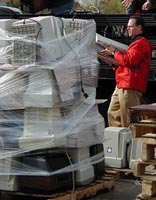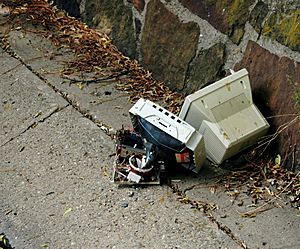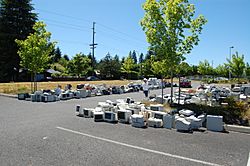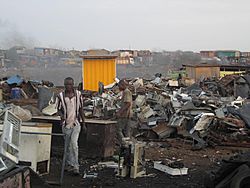Electronic waste recycling facts for kids

Electronic waste recycling, often called e-waste recycling, is about taking apart old electronics and separating their different parts and materials. Sometimes, you might hear specific terms like computer recycling or mobile phone recycling. Instead of throwing away old gadgets, we can reuse them, donate them, or fix them. This helps our planet a lot!
Since the early 1990s, more and more devices are being recycled worldwide. This is because people are learning how important it is. We recycle electronics mainly to get back valuable rare earth metals and precious metals, which are hard to find. We also recover plastics and other metals. These materials can then be used to make new devices, creating a "circular economy" where things are reused instead of just thrown away. Recycling also stops harmful substances from getting into our environment.
Contents
Why Recycle Electronics?
Old computers and electronics are full of valuable materials that can be used again. But if they aren't recycled, they can release harmful chemicals. Technology changes very quickly, and new gadgets are often cheap. This means many computers and other electronics become old very fast.
Protecting Our Planet
When electronics end up in landfills or are burned, they can release dangerous materials. These include lead, mercury, and cadmium. These chemicals can pollute the soil, groundwater, and air. Even though electronics are a small part of all waste, they are much more dangerous because of these toxins.
For example, an old computer screen can have a lot of lead inside. Circuit boards also contain lead, which can leak into water or cause air pollution if burned. In some landfills, about 40% of the lead comes from e-waste.
Getting Valuable Materials Back
Many materials in computer parts can be recovered and used again. Reusing things like tin, silicon, iron, aluminium, and different plastics helps save money when making new systems. Electronic parts often contain copper, gold, silver, and platinum, which are all very valuable.
Recycling these materials means we don't have to dig up as much new stuff from the Earth. This helps protect natural resources and reduces the energy needed to make new products.
Stopping Harmful Exports
Sometimes, old electronics are sent to countries with fewer rules about pollution. This is a big problem. The Basel Convention is an agreement that tries to stop dangerous waste, like old computer screens, from being shipped to other countries without permission.
Some companies might send old computers to less developed countries because it's cheaper. But this can harm people and the environment there. Workers might break apart old products without protection, releasing toxins into the soil. Other methods, like burning wires or using acid baths, also release dangerous chemicals into the air and water.
Rules for E-Waste
Many countries have rules to make sure electronics are recycled safely.
Europe's Rules

Switzerland started the first e-waste recycling system in 1991. They began with old refrigerators and slowly added all other electronic devices. The European Union also created a similar system in 2003 called the Waste Electrical and Electronic Equipment Directive (WEEE Directive).
This law makes sure that manufacturers help pay for collecting and treating electronics from homes. However, recycling old electronics from businesses often has different rules and costs. Recently, rules in the UK changed to classify some e-waste as hazardous due to certain chemicals.
United States' Rules
The United States Congress is working on laws about e-waste. The main federal law for waste is the Resource Conservation and Recovery Act. Many states also have their own laws about recycling computers and other electronics.
For example, in 2001, Arkansas passed a law to manage and recycle old computer equipment from state agencies. Other laws help fund research into better ways to recycle electronics.
Asia's Rules
In Japan, sellers and makers of certain electronics, like TVs, must recycle them. South Korea and Taiwan also require electronics companies to recycle a large part of their used products. In South Korea, cities like Seoul have special e-waste recycling programs.
A report by the UNEP (United Nations Environment Programme) says that the amount of e-waste, including phones and computers, could grow by a lot in countries like India over the next ten years.
Some people believe that strict rules in richer countries make it cheaper to send e-waste to developing countries. This avoids the cost of safely removing dangerous parts. But others argue that fair trade programs can create good jobs and bring affordable technology to countries where old electronics are often repaired and reused.
How to Recycle Electronics
There are several ways to recycle your old electronics.
Recycling for Individuals
You can sell your old devices online, donate them to groups that need them, send them back to the company that made them, or take them to a recycling center.
Professional Recycling

In professional recycling, TVs, monitors, phones, and computers are first checked to see if they can be reused or fixed. If they are broken, they might be taken apart for valuable pieces. Other e-waste is shredded into small pieces. Magnets remove iron and steel. Other machines separate non-iron metals. Precious metals can be removed with special processes. The remaining glass and plastic are also separated and sold.
Companies must be careful with old computers because of the information stored on them and the proper way to get rid of them. They often use special recycling companies that follow strict rules.
Selling Old Devices
You can sell your old electronics online through auction sites or classified ads. Some companies also buy working or broken laptops and notebook computers from people and businesses. They often give you a price online, send you a shipping label, and then pay you after they receive and process your device.
Manufacturer Take-Back Programs
When you buy a new computer, check if the company offers recycling services for your old one. Many big computer makers offer some kind of recycling. You might be able to mail in your old computer or have it picked up.
For example, Hewlett-Packard offers free recycling for some products and has recycled a huge amount of e-waste globally. Dell Computers and Apple Inc. also take back old products when you buy new ones, often fixing and reselling them.
Donating to Nonprofits
Many families and schools need computers but can't afford them. Nonprofit organizations, like InterConnection.org, collect and refurbish old computers. They then give them to people, schools, or charities that need them, both locally and around the world. In Canada, groups like The Electronic Recycling Association do similar work.
History of E-Waste Recycling
Even though electronics have been popular for a long time, recycling them didn't really start until the early 1990s. As new gadgets came out faster, older ones quickly became outdated. It also became harder to fix electronics locally. People started throwing away items more often instead of repairing them.
In 1988, two big incidents showed how serious the e-waste problem was becoming. A ship called the Khian Sea dumped thousands of tons of toxic ash into the ocean. Also, a large illegal toxic waste dump was found in Italy. These events led to the creation of the Basel Convention in 1989, which aimed to stop dangerous waste from being sent from rich countries to poorer ones.
In 1991, Switzerland started the first e-waste recycling system. Soon after, other companies began to emerge, especially in Europe, where new laws made retailers responsible for taking back old electronics.
However, many countries couldn't handle all the e-waste they produced, so they started sending it to developing countries. This was cheaper, but it caused environmental and health problems there. Demand for e-waste grew in Asia because people found they could get valuable metals like copper, iron, and gold from it.
The European Union's WEEE Directive became law in 2003, covering all types of appliance recycling. This was followed by similar laws in places like California. The 2000s saw a huge increase in both electronics sales and e-waste, leading to more modern recycling facilities.
E-cycling
E-cycling is a term used by the United States Environmental Protection Agency (EPA). It means donating, reusing, or recycling used electronics. It includes collecting, fixing, and recycling parts or metals from old electronic equipment, also known as electronic waste. E-cyclable items are almost anything with a cord, light, or battery, like TVs, computers, phones, and stereos.
More money is being invested in e-cycling because technology changes so fast. Also, people are worried about wrong ways of disposing of e-waste. Higher metal prices also encourage more recycling.
Benefits of E-cycling
E-cycling helps the environment by preventing pollution. For example, if old electronics are processed properly, it can stop harmful chemicals from polluting water, like in some areas of China. E-cycling also helps us get back materials like gold, which means less mining is needed. This can also reduce money going to groups that profit from mining in harmful ways.
Some people believe that e-cycling laws can save taxpayers money. This is because the companies that make electronics would be responsible for recycling them. This might also encourage manufacturers to use fewer materials, make products that last longer, and create safer recycling systems.
Challenges of E-cycling
Not everyone agrees about e-cycling. Some critics say it can make electronics more expensive for consumers. They also worry that e-cycling facilities could accidentally harm the environment. Another concern is that e-waste doesn't make up a huge part of all waste.
Taking apart electronics can be costly and sometimes dangerous because of the heavy metals. Also, there's a risk of identity fraud if personal information on hard drives isn't properly erased.
What Happens to E-Waste?
A common criticism is that people think their e-waste is being recycled, but it's actually sent to developing countries like China, India, and Nigeria. Studies suggest that a large amount of e-waste from developed countries is sent overseas, while much of the rest goes into landfills.
However, some argue that if these electronics are repaired and reused in those countries, it can be better than just shredding them. In the European Union, new rules were made to greatly reduce the export of untreated e-waste. The goal is to focus more on recycling and recovering valuable metals.
Current Efforts and Policies
Many government laws and community efforts are helping e-cycling grow. California passed a law in 2003 that makes consumers pay a small fee for certain electronics. This money then goes to recycling companies. Other states focus on making manufacturers responsible for recycling or banning e-waste from landfills.
Companies like Dell, Best Buy, Sony, and Samsung have also started their own recycling programs. There are also groups like the Computer TakeBack Campaign that encourage responsible recycling. Many people believe the U.S. should follow Europe's example, where manufacturers are required to take back and recycle their products.
Keeping Your Data Safe
E-waste can be a risk to your personal information. If hard drives are not properly erased before a computer is thrown away, sensitive data can be accessed. This includes things like credit card numbers, financial details, and online transaction records.
Why Secure Recycling Matters
If customer data is stolen, it can lead to identity theft. This can harm a company's reputation and cost them a lot of money. Companies that handle sensitive information, like banks, must have policies to protect data. The United States Department of Defense has standards for how recyclers should handle data to keep it safe.
How to Recycle Securely
There are ways to make sure your data is destroyed when you recycle hardware. Companies that specialize in secure recycling follow strict guidelines. They often receive hardware in locked vehicles, shred hard drives, and then separate the metals for recycling. This ensures that your private information is completely gone.
Organizations like the National Association for Information Destruction (NAID) set standards for companies that destroy information. They help make sure that data destruction is done safely and ethically.
See also
 In Spanish: Reciclaje de computadoras para niños
In Spanish: Reciclaje de computadoras para niños
- Appliance recycling
- Mobile phone recycling
Images for kids
 | William Lucy |
 | Charles Hayes |
 | Cleveland Robinson |





